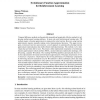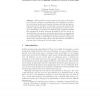127
click to vote
CORR
2010
Springer
15 years 2 months ago
2010
Springer
Temporal difference methods are theoretically grounded and empirically effective methods for addressing reinforcement learning problems. In most real-world reinforcement learning ...
137
click to vote
AAAI
2006
15 years 3 months ago
2006
Reinforcement learning problems are commonly tackled with temporal difference methods, which attempt to estimate the agent's optimal value function. In most real-world proble...
128
click to vote
ECML
2004
Springer
15 years 7 months ago
2004
Springer
Although tabular reinforcement learning (RL) methods have been proved to converge to an optimal policy, the combination of particular conventional reinforcement learning techniques...
145
click to vote
ATAL
2005
Springer
15 years 7 months ago
2005
Springer
Reinforcement learning problems are commonly tackled with temporal difference methods, which use dynamic programming and statistical sampling to estimate the long-term value of ta...
145
click to vote
ICTAI
2006
IEEE
15 years 8 months ago
2006
IEEE
In order for an autonomous agent to behave robustly in a variety of environments, it must have the ability to learn approximations to many different functions. The function approx...


